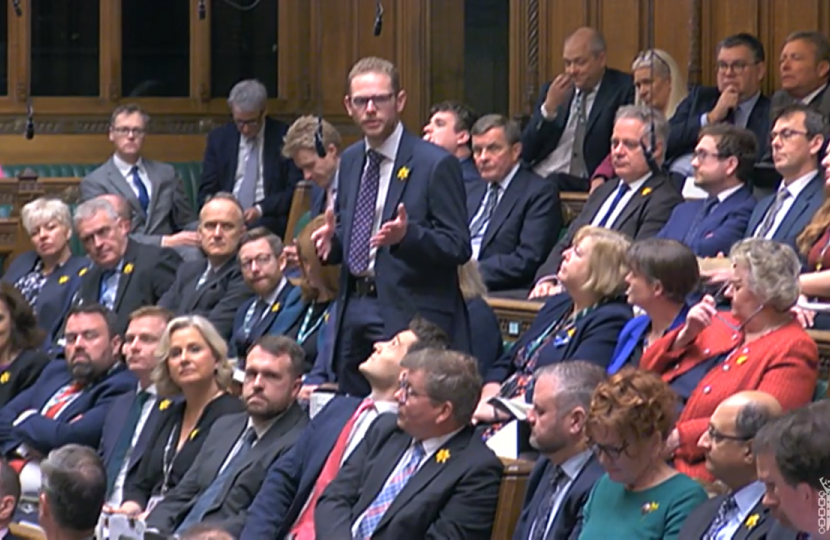
The recent loss of Wilko on our high streets should refocus minds about the need for action to help improve the state of our town centres and high streets.
Once vibrant and bustling, our high streets up and down the country have struggled to evolve. We have seen the loss of once much-loved brands and towns becoming victim to drug fuelled crime. Increasing trends towards online shopping, out of town retail development and the impacts of the pandemic have all contributed to the competition faced by traditional retailers. There is no point attempting to reverse the new realities facing us but we should do more to help our high streets take a new leap forwards and remain relevant.
I recently called a debate in Parliament focused on the importance to our high streets of heritage and the need to reclaim many of the empty historic forgotten spaces in our town centres. If we have learnt anything it is that people do not want to live in places that all look the same and are devoid of all individuality. We have some pretty unique properties on our high streets, full of character the likes of which cannot be found anywhere else in the world. These quirky empty spaces can have an important role to play in supporting small businesses to grow and create more new skilled opportunities.
The idea that our high streets have ever been in a fixed state of constancy is far from accurate. The true picture is one of constant evolution. Once upon a time we saw far greater numbers living in our town centres above shops: that trend shifted and today too many of the upper floors lay empty and derelict with very few people living in the centres of our towns and cities.
There are some fantastic examples of how we can breathe new life, attracting in new commercial and residential uses. I have seen in my constituency with our local shopping precinct the Longton Exchange Shopping Centre the positive impact a good landlord can have. Here we have seen investment in the centre and more flexible, attractive tenancies which has nurtured new independent retailers like ‘So Very Dog’ and ‘Keep It Local’. It was though my intervention in getting their business rates reduced to a more reasonable level that it wasn’t all over before it had even begun.
The blocks to change and barriers to innovation are all too great. Only this week whilst out and about with police and council officers in the town centre did I hear from one local food shop the difficulty faced in getting permission to install shutters to protect his business and how terrified he was about the resultant risk of his windows being smashed. This is wrong: it should not be a bureaucratic nightmare to make basic improvements to protect high street businesses from mindless criminals. Cracking down on crime is one thing, but we must also make it far easier for our high streets to help themselves.
All too often it is just all too difficult, or the answer is repeatedly no. Of course, focused Government investment is always incredibly welcome and Levelling-Up Funding has helped address viability gaps, unlocking new development on derelict sites like the Crown Works in Longton. Yet it can’t just be about more Government money. We need to create the right conditions to encourage more private investment and make it easier to deliver when we get there.
Our archaic planning system needs to evolve to meet the needs of our communities and support the delivery of levelling up. The current system is not responsive enough to the pace of change on our high streets and is no longer able to achieve the objectives for which it was originally devised. As I made clear in my debate, many of our conservation areas are rated at risk and in a very poor state of repair. Carrots and sticks are clearly necessary, including proactive use of enforcement to help tackle absent and rogue property owners. Yet we’ve reached a point where the system has become so ineffective and the bar to intervention is set so high that almost no enforcement actually takes place. This is only exacerbated by the shortage of skilled officers especially when it comes to heritage enforcement.
I absolutely support the measures set out in the Levelling Up and Regeneration Bill around compulsory auctions to combat absent property owners, and increased penalties for those who neglect our heritage. However, this will only be of help if councils have the resources needed to make use of these powers. We need to further free up our planning system which is swamped with bureaucracy and deters new uses on our high streets. The introduction in 2020 of a new category E mixed commercial usage was a positive step forwards: we should now take the next step by giving councils the power to apply this retrospectively to all properties within the designated town centre boundary.
This sort of action would make it far easier and quicker for new business uses to occupy those empty spaces on the high street, removing some of the unnecessary hurdles often faced. Increasing the diversity of uses on our high streets and boosting footfall is essential. And we need to bust the backlogs faced in many local planning departments so a greater focus can be given to things people care about most, like the enforcement against those who neglect and damage our precious heritage.
Whilst the battle to save our high streets and the important heritage inherent in many of them is still ongoing, it is not yet lost. If we get this right, with the right interventions that remove barriers and incentivise in new uses and investment, there can yet be a next chapter in the evolution of our much loved high streets.
